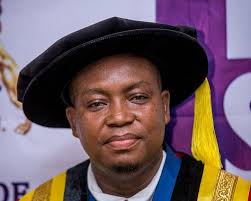The recent decision by the US Embassy to impose visa restrictions on individuals who may disrupt Ghana’s democratic process ahead of the upcoming December elections has received significant praise as a measure to promote peace, stability, and political accountability in Ghana. This policy, aimed at curbing political violence, sends a strong message that any attempt to undermine democracy could have serious personal consequences for those involved.
However, new information suggests that this policy may have roots in the work of a Ghanaian academic, Rev. Prof. Emmanuel Yao Nash. Between 2014 and 2016, Rev. Prof. Nash, a prominent peace advocate, conducted a comprehensive study on electoral violence and its prevention in Ghana. His research concluded with a recommendation that international embassies, including the US Embassy, halt the issuance of visas to politicians until elections were completed. He argued that denying politicians the ability to leave the country during election season would compel them to act with integrity and responsibility, knowing they were accountable to local laws and citizens.
Rev. Prof. Nash’s findings were widely publicised, including an article in Graphic Online in October 2016 titled, “Withhold Visas for Politicians Till Elections.” His appeal for embassies to adopt his approach to promote electoral decency stemmed from a foundation of academic rigor and peace advocacy.
Despite the depth of Rev. Prof. Nash’s research and his efforts to gain embassy support, this reporter has learned that the US Embassy did not acknowledge the professor's ideas or offer support. Furthermore, the embassy reportedly declined to attend the launch of the Ghana Peace Awards (GPA) in 2016, an event inspired by his research to honour individuals and organisations dedicated to promoting peace in Ghana.
Nevertheless, the US government now appears to have adopted Rev. Prof. Nash’s recommendation as its own. US Secretary of State Antony Blinken has since imposed similar visa restrictions in countries such as Sierra Leone, Bangladesh, and Liberia. These actions are framed as part of the US government's commitment to supporting fair elections worldwide, with visa restrictions serving as a deterrent to political actors who might undermine the democratic process.
While the implementation of Rev. Prof. Nash’s recommendations underscores their value, his contributions remain largely unrecognised. Formal acknowledgment from the US Embassy would not only honour Rev. Prof. Nash’s original work but also lend greater credibility to future research efforts aimed at fostering peace in Ghana, Africa, and beyond.
Latest Stories
-
Jordan Ayew injury not as bad as feared – Leicester City boss
4 mins -
Stonebwoy heads to North America for UP & RUNNIN6 tour
5 mins -
FDA explains extension of best-before date for ‘expired’ rice
10 mins -
Rebecca Akufo-Addo, Mahama storm Akuapem North as NPP NDC slugs it out
12 mins -
Fatawu’s injury a big blow for us – Leicester City manager
23 mins -
No MC has influenced pop culture in 2024 more than me – Portfolio
25 mins -
Kpando NCCE holds dialogue for Parliamentary Candidates
40 mins -
Bawumia solicits support of CSOs to tackle ‘entrenched interests’ in corruption fight
43 mins -
I’m looking forward to working with CSOs, research institutions; they have a lot to offer – Bawumia
46 mins -
The former illegal miner who became valedictorian: Eliasu Yahaya Bansi’s KNUST journey
58 mins -
Prof Opoku-Agyemang slams gov’t over supply of ‘expired’ rice to Senior High Schools
1 hour -
‘Expired rice’: FDA fines Lamens Investments GH¢100k for regulatory violations
1 hour -
No student has been served unwholesome meals – Nana Boakye
1 hour -
Galamsey has left our river deities powerless – Fetish Priest laments
2 hours -
It was unfair to destroy Leslie’s Fantasy Dome – Okraku-Mantey
2 hours

